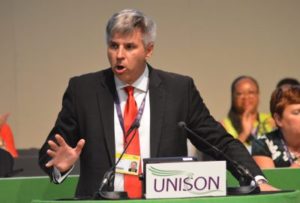
“UNISON will smash the public sector 1% pay cap in the next twelve months”, promised Gordon Mackay, NEC, “a pay cap that is driving loyal, dedicated and hard working people and their families into poverty.”
Gordon set out the union’s strategy to tackle in work poverty, campaigning to not only end the pay cap, but also to stop cuts to in work benefits, and to work with the TUC to achieve a £10 minimum wage
Gordon slammed the Tory Government, “They have outperformed all their venal, working class hating predecessors, “They are the first government that has engineered a situation where most people living in poverty are working.
“Over seven and a half million people including nearly three million children are now living in poverty in households that are in work. They rely on food banks, they rely on pay day loans, they decide what meal to go without to give their kids a breakfast”
“Just two weeks ago we though this country was going to vote for an unfair Britain. A Britain where public service workers exist on zero hours and pay feezes whilst chief execs reach up to their magic money trees and handed themselves pay rises of up to £43m. Well twelve days ago this country said no more.”
Jane Carolan, NEC, emphasised the effects of the public sector pay cap – wages have fallen in value for the last ten years and public services, from health to social care through to social work and other local government services cannot recruit and retain staff. “As a trade union it is our duty to provide the leadership to smash that cap.”
“We know that Jeremy Corbyn and John McDonnell are listening to our political messaging. But while Theresa May will publicly applaud our heroes in the emergency services at whatever disasters are thrown at them, that applause never translates into pounds, shillings and pence that would see our members fairly rewarded for the jobs that they do.
“That’s the fight that we face. And if political pressure isn’t enough to shift the Tories there is only one answer. And that is industrial pressure, strike action. Every single person in this hall has a job to do. Saying the members are not ready for action isn’t good enough, you need to make them ready for action. All of them.”
Jim McFarlane, Dundee City, explained we have endured a period of austerity that has lasted longer than the second world war. “Whilst those at the top of society have continued to rake it in over the last few years. Our members pay had fallen. £10 an hour would make a huge difference for thousands of our members.”
He added that whilst the Trade Union Act has made it more difficult, whilst we didn’t meet the turnout threshold in the recent pay ballot in Scottish Local Government, there were some positives – recruiting new members and activists and building up our databases of members’ emails and mobiles for future campaigns.
“We are at our best when we campaign and organise, taking action and winning. We have been on the defensive for too long. The Tories are in disarray. Let’s use that to our advantage.”
Jim Main, Glasgow City, reflected upon the pay claim cycle “We have to avoid the annual ritual where we lodge the claim, the employers keep us dangling for several months, we have a consultative ballot, the ballot… and you know the rest. And now we have the 50% turnout threshold for the formal ballot that held us back in Scotland recently.”
Jim pointed out, “We should seize the opportunities presented by Jeremy Corbyn’s campaign – only six million people are in trade unions, yet twelve million voted for Labour. Some of these people must work in public services. We must find a way of bringing them in.”
Conference Home | Conference Guide | Service Group Reports | Archive | UNISON UK reports
